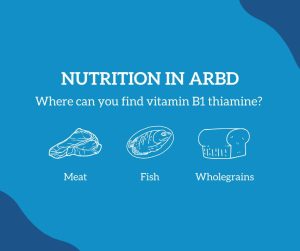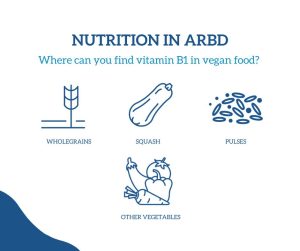Alcohol-Related Brain Damage (ARBD) can significantly affect cognitive and physical health, often requiring a comprehensive recovery plan. One critical yet often overlooked component of this recovery is proper nutrition. This blog explores the vital role of nutrition, particularly the importance of thiamine (vitamin B1), in supporting individuals with ARBD on their journey to improved health.
Why Nutrition Matters in ARBD Recovery
Chronic alcohol consumption not only depletes essential nutrients but also impairs the body’s ability to absorb and utilise them effectively. This nutritional imbalance can exacerbate brain damage and hinder recovery. Implementing a balanced and nutrient-rich diet can aid cognitive function, enhance overall health, and improve quality of life for those recovering from ARBD.
Thiamine (Vitamin B1): The Cornerstone of Recovery
Thiamine deficiency is a common issue in individuals with ARBD, as alcohol consumption interferes with the absorption and storage of this essential vitamin. Thiamine plays a pivotal role in energy metabolism and brain function, and its deficiency can lead to severe conditions like Wernicke’s encephalopathy and Korsakoff’s syndrome. Ensuring adequate thiamine intake through diet and supplements is a critical first step in ARBD recovery.


Building a Balanced Diet for Cognitive and Physical Health
A balanced diet tailored to the needs of someone recovering from ARBD should include:
- Whole Grains and Legumes: Excellent sources of thiamine and other B vitamins essential for brain health.
- Fresh Fruits and Vegetables: Packed with antioxidants, vitamins, and minerals that support cellular repair and immune function.
- Lean Proteins: Foods like fish, chicken, and tofu provide amino acids critical for neurotransmitter production and muscle repair.
- Healthy Fats: Omega-3 fatty acids found in fish, nuts, and seeds support brain health and reduce inflammation.
- Hydration: Adequate water intake is vital for maintaining metabolic processes and preventing dehydration.
Tips for Caregivers and Patients
Recovery from ARBD can be challenging, but caregivers and patients can take proactive steps to ensure nutritional health:
- Prioritise Thiamine Supplementation: Consult with a healthcare professional to determine the appropriate dosage and duration of thiamine supplementation.
- Plan Balanced Meals: Create meal plans that incorporate a variety of nutrient-dense foods to ensure all nutritional needs are met.
- Monitor Progress: Keep track of cognitive and physical improvements to adjust dietary strategies as needed.
- Seek Professional Guidance: Work with a dietitian or nutritionist experienced in ARBD recovery for personalised advice.
- Stay Consistent: Nutritional recovery takes time; consistency is key to seeing long-term benefits.
How ARBD Care Supports Nutritional Recovery
At ARBD Care to meet your exact needs, we ensure your dietary and nutritional requirements are taken into account from the moment you move in. We tailor menus to suit all tastes and needs and change them regularly to keep mealtimes interesting, with different choices offered every day.
As well as providing a balanced diet, our kitchens freshly bake all sorts of goodies; always going that little bit further to make mealtimes a time to look forward to.
Our chefs are passionate about using the freshest ingredients, sometimes grown in our gardens (which the residents tend to), or we source from local suppliers wherever possible, to give our residents tasty, wholesome, seasonal food that they enjoy.
The Bigger Picture: Nutrition as Part of a Holistic Recovery Plan
While nutrition is a cornerstone of ARBD recovery, it should be part of a broader, holistic approach that includes medical treatment, cognitive therapy, and lifestyle changes. By addressing all aspects of health, individuals with ARBD can achieve more effective and sustainable recovery.
Nutrition, particularly adequate thiamine intake, plays an indispensable role in recovering from Alcohol-Related Brain Damage. Through a balanced diet and informed nutritional strategies, individuals with ARBD can enhance their cognitive function, improve overall health, and take meaningful steps toward a better quality of life. For caregivers, supporting this aspect of recovery can make a profound difference in their loved one’s journey.
Start incorporating these nutritional principles today to pave the way for a healthier tomorrow.
For more information and to view a sample meal plan, please visit: Mealtimes & Nutrition












